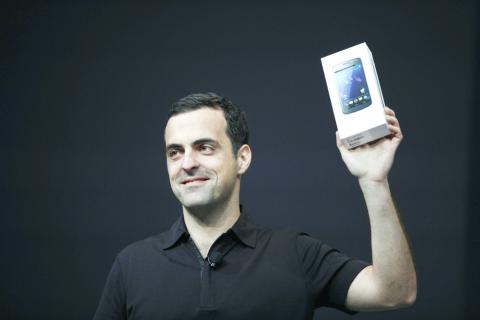Samsung Electronics Co, the world’s biggest maker of mobile phones, was barred from selling its Galaxy Nexus smartphone in the US by a second court ruling this week in its global patent dispute with Apple Inc.
The ruling by US District Judge Lucy Koh in San Jose, California, follows her order on Tuesday blocking US sales of Samsung’s Galaxy Tab 10.1 computer in the patent and trademark-infringement lawsuit over smartphones and tablets. On June 7, Koh expedited evidence sharing for Apple’s bid to block sales of Samsung’s newest Galaxy smartphone, the Galaxy S III.
“Although Samsung will necessarily be harmed by being forced to withdraw its product from the market before the merits can be determined after a full trial, the harm faced by Apple absent an injunction is greater,” Koh said in her ruling on Friday. “Apple’s interest in enforcing its patent rights is particularly strong because it has presented a strong case on the merits.”

Photo: AFP
The world’s two biggest makers of high-end phones have accused each other of copying designs and technology for mobile devices and are fighting patent battles on four continents to retain their dominance in the US$219 billion global smartphone market.
After rejecting Apple’s repeated requests for injunctions blocking sales of Samsung products, Koh, following an appeals court ruling in Apple’s favor, has granted Apple two important injunctions this week.
“It’s a big deal,” said Carl Howe, an analyst with Yankee Group, a Boston-based technology research firm. “Samsung is perhaps the best and most successful challenge to Apple in the smartphone business, so to win an injunction against your biggest competitor is pretty profound.”
Taken with the earlier ruling on the Galaxy Tab, he said, “It does imply that there will be problems for Samsung.”
Samsung accounts for 29.1 percent of global shipments of smartphones, according to market research firm IDC. California-based Apple is second with 24.2 percent, IDC said.
Apple has sought to bar as many as 25 Samsung smartphones in addition to the Nexus model covered by Friday’s ruling, including the latest, the Galaxy S III. The Nexus phone was the first smartphone to run Google’s Android version 4.0.
“Samsung is disappointed, as the court’s decision will restrict US consumer choice in the smartphone market,” Adam Yates, a Samsung spokesman, said in an e-mailed statement. “We will take all available measures, including legal action, to ensure the Galaxy Nexus remains available to consumers.”
The South Korean electronics maker is working closely with Google to resolve the sales ban as the disputed patent involves the US company’s search function, Samsung said in a separate statement yesterday.
Outside courtroom battles, Samsung and Apple also have a close business relationship. Samsung is one of Apple’s biggest suppliers, making parts including semiconductors and screens. About 7.6 percent of Samsung’s revenue comes from Apple, according to data compiled by Bloomberg.
Earlier in the week, Kim Young Chan, a Seoul-based analyst at Shinhan Investment Corp, said Samsung’s “fundamentals will stay intact” so long as smartphone sales are not blocked.
Apple is the biggest buyer of Samsung chips and displays.

RECYCLE: Taiwan would aid manufacturers in refining rare earths from discarded appliances, which would fit the nation’s circular economy goals, minister Kung said Taiwan would work with the US and Japan on a proposed cooperation initiative in response to Beijing’s newly announced rare earth export curbs, Minister of Economic Affairs Kung Ming-hsin (龔明鑫) said yesterday. China last week announced new restrictions requiring companies to obtain export licenses if their products contain more than 0.1 percent of Chinese-origin rare earths by value. US Secretary of the Treasury Scott Bessent on Wednesday responded by saying that Beijing was “unreliable” in its rare earths exports, adding that the US would “neither be commanded, nor controlled” by China, several media outlets reported. Japanese Minister of Finance Katsunobu Kato yesterday also

Jensen Huang (黃仁勳), founder and CEO of US-based artificial intelligence chip designer Nvidia Corp and Taiwan Semiconductor Manufacturing Co (TSMC, 台積電) on Friday celebrated the first Nvidia Blackwell wafer produced on US soil. Huang visited TSMC’s advanced wafer fab in the US state of Arizona and joined the Taiwanese chipmaker’s executives to witness the efforts to “build the infrastructure that powers the world’s AI factories, right here in America,” Nvidia said in a statement. At the event, Huang joined Y.L. Wang (王英郎), vice president of operations at TSMC, in signing their names on the Blackwell wafer to

‘DRAMATIC AND POSITIVE’: AI growth would be better than it previously forecast and would stay robust even if the Chinese market became inaccessible for customers, it said Taiwan Semiconductor Manufacturing Co (TSMC, 台積電) yesterday raised its full-year revenue growth outlook after posting record profit for last quarter, despite growing market concern about an artificial intelligence (AI) bubble. The company said it expects revenue to expand about 35 percent year-on-year, driven mainly by faster-than-expected demand for leading-edge chips for AI applications. The world’s biggest contract chipmaker in July projected that revenue this year would expand about 30 percent in US dollar terms. The company also slightly hiked its capital expenditure for this year to US$40 billion to US$42 billion, compared with US$38 billion to US$42 billion it set previously. “AI demand actually

RARE EARTHS: The call between the US Treasury Secretary and his Chinese counterpart came as Washington sought to rally G7 partners in response to China’s export controls China and the US on Saturday agreed to conduct another round of trade negotiations in the coming week, as the world’s two biggest economies seek to avoid another damaging tit-for-tat tariff battle. Beijing last week announced sweeping controls on the critical rare earths industry, prompting US President Donald Trump to threaten 100 percent tariffs on imports from China in retaliation. Trump had also threatened to cancel his expected meeting with Chinese President Xi Jinping (習近平) in South Korea later this month on the sidelines of the APEC summit. In the latest indication of efforts to resolve their dispute, Chinese state media reported that